112 scholarly books by Bucknell University Press and 7
have author last names that start with W
112 scholarly books by Bucknell University Press and 7
112 scholarly books by Bucknell University Press
7 have author last names that start with W have author last names that start with W
7 have author last names that start with W have author last names that start with W
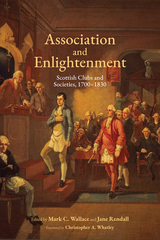
Association and Enlightenment
Scottish Clubs and Societies, 1700-1830
Mark C. Wallace
Bucknell University Press, 2021
Social clubs as they existed in eighteenth- and early nineteenth-century Scotland were varied: they could be convivial, sporting, or scholarly, or they could be a significant and dynamic social force, committed to improvement and national regeneration as well as to sociability. The essays in this volume examine the complex history of clubs and societies in Scotland from 1700 to 1830. Contributors address attitudes toward associations, their meeting places and rituals, their links with the growth of the professions and with literary culture, and the ways in which they were structured by both class and gender. By widening the context in which clubs and societies are set, the collection offers a new framework for understanding them, bringing together the inheritance of the Scottish past, the unique and cohesive polite culture of the Scottish Enlightenment, and the broader context of associational patterns common to Britain, Ireland, and beyond.
[more]
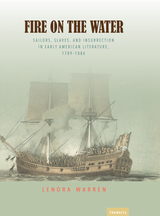
Fire on the Water
Sailors, Slaves, and Insurrection in Early American Literature, 1789-1886
Lenora Warren
Bucknell University Press, 2019
Lenora Warren tells a new story about the troubled history of abolition and slave violence by examining representations of shipboard mutiny and insurrection in late eighteenth- and early nineteenth-century Anglo-American and American literature. Fire on the Water centers on five black sailors, whose experiences of slavery and insurrection either inspired or found resonance within fiction: Olaudah Equiano, Denmark Vesey, Joseph Cinqué, Madison Washington, and Washington Goode. These stories of sailors, both real and fictional, reveal how the history of mutiny and insurrection is both shaped by, and resistant to, the prevailing abolitionist rhetoric surrounding the efficacy of armed rebellion as a response to slavery. Pairing well-known texts with lesser-known figures (Billy Budd and Washington Goode) and well-known figures with lesser-known texts (Denmark Vesey and the work of John Howison), this book reveals the richness of literary engagement with the politics of slave violence.
Published by Bucknell University Press. Distributed worldwide by Rutgers University Press.
Published by Bucknell University Press. Distributed worldwide by Rutgers University Press.
[more]
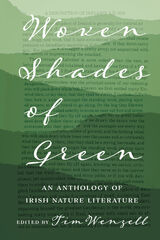
Woven Shades of Green
An Anthology of Irish Nature Literature
Tim Wenzell
Bucknell University Press, 2019
Woven Shades of Green is an annotated selection of literature by authors who focus on the natural world and the beauty of Ireland. It begins with the Irish monks and their largely anonymous nature poetry, written at a time when Ireland was heavily forested. A section follows devoted to the changing Irish landscape, through both deforestation and famine, including the nature poetry of William Allingham, and James Clarence Mangan, essays from Thomas Gainford and William Thackerary, and novel excerpts from William Carleton and Emily Lawless. The anthology then turns to the nature literature of the Irish Literary Revival, including Yeats and Synge, and an excerpt from George Moore’s novel The Lake. Part four shifts to modern Irish nature poetry, beginning with Patrick Kavanaugh, and continuing with the poetry of Seamus Heaney, Eavan Boland, and others. Finally, the anthology concludes with a section on various Irish naturalist writers, and the unique prose and philosophical nature writing of John Moriarty, followed by a comprehensive list of environmental organizations in Ireland, which seek to preserve the natural beauty of this unique country.
Published by Bucknell University Press. Distributed worldwide by Rutgers University Press.
Published by Bucknell University Press. Distributed worldwide by Rutgers University Press.
[more]
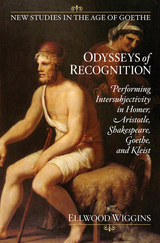
Odysseys of Recognition
Performing Intersubjectivity in Homer, Aristotle, Shakespeare, Goethe, and Kleist
Ellwood Wiggins
Bucknell University Press, 2019
Literary recognition is a technical term for a climactic plot device. Odysseys of Recognition claims that interpersonal recognition is constituted by performance, and brings performance theory into dialogue with poetics, politics, and philosophy. By observing Odysseus figures from Homer to Kleist, Ellwood Wiggins offers an alternative to conventional intellectual histories that situate the invention of the interior self in modernity. Through strategic readings of Aristotle, this elegantly written, innovative study recovers an understanding of interpersonal recognition that has become strange and counterintuitive. Penelope in Homer’s Odyssey offers a model for agency in ethical knowledge that has a lot to teach us today. Early modern and eighteenth-century characters, meanwhile, discover themselves not deep within an impenetrable self, but in the interpersonal space between people in the world. Recognition, Wiggins contends, is the moment in which epistemology and ethics coincide: in which what we know becomes manifest in what we do.
Published by Bucknell University Press. Distributed worldwide by Rutgers University Press.
Published by Bucknell University Press. Distributed worldwide by Rutgers University Press.
[more]
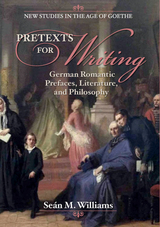
Pretexts for Writing
German Romantic Prefaces, Literature, and Philosophy
Seán M. Williams
Bucknell University Press, 2019
Around 1800, print culture became a particularly rich source for metaphors about thinking as well as writing, nowhere more so than in the German tradition of Dichter und Denker. Goethe, Jean Paul, and Hegel (among many others) used the preface in order to reflect on the problems of writing itself, and its interpretation. If Sterne teaches us that a material book enables mind games as much as it gives expression to them, the Germans made these games more theoretical still. Weaving in authors from Antiquity to Agamben, Williams shows how European–and, above all, German–Romanticism was a watershed in the history of the preface. The playful, paradoxical strategies that Romantic writers invented are later played out in continental philosophy, and in post-Structuralist literature. The preface is a prompt for playful thinking with texts, as much as it is conventionally the prosaic product of such an exercise.
Published by Bucknell University Press. Distributed worldwide by Rutgers University Press.
Published by Bucknell University Press. Distributed worldwide by Rutgers University Press.
[more]
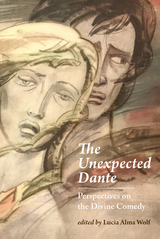
The Unexpected Dante
Perspectives on the Divine Comedy
Lucia Alma Wolf
Bucknell University Press, 2021
Dante Alighieri’s long poem The Divine Comedy has been one of the foundational texts of European literature for over 700 years. Yet many mysteries still remain about the symbolism of this richly layered literary work, which has been interpreted in many different ways over the centuries.
The Unexpected Dante brings together five leading scholars who offer fresh perspectives on the meanings and reception of The Divine Comedy. Some investigate Dante’s intentions by exploring the poem’s esoteric allusions to topics ranging from musical instruments to Roman law. Others examine the poem’s long afterlife and reception in the United States, with chapters showcasing new discoveries about Nicolaus de Laurentii’s 1481 edition of Commedia and the creative contemporary adaptations that have relocated Dante’s visions of heaven and hell to urban American settings.
This study also includes a guide that showcases selected treasures from the extensive Dante collections at the Library of Congress, illustrating the depth and variety of The Divine Comedy’s global influence. The Unexpected Dante is thus a boon to both Dante scholars and aficionados of this literary masterpiece.
Published by Bucknell University Press in association with the Library of Congress. Distributed worldwide by Rutgers University Press.
The Unexpected Dante brings together five leading scholars who offer fresh perspectives on the meanings and reception of The Divine Comedy. Some investigate Dante’s intentions by exploring the poem’s esoteric allusions to topics ranging from musical instruments to Roman law. Others examine the poem’s long afterlife and reception in the United States, with chapters showcasing new discoveries about Nicolaus de Laurentii’s 1481 edition of Commedia and the creative contemporary adaptations that have relocated Dante’s visions of heaven and hell to urban American settings.
This study also includes a guide that showcases selected treasures from the extensive Dante collections at the Library of Congress, illustrating the depth and variety of The Divine Comedy’s global influence. The Unexpected Dante is thus a boon to both Dante scholars and aficionados of this literary masterpiece.
Published by Bucknell University Press in association with the Library of Congress. Distributed worldwide by Rutgers University Press.
[more]
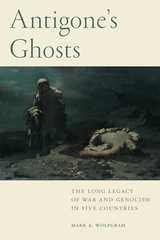
Antigone's Ghosts
The Long Legacy of War and Genocide in Five Countries
Mark A. Wolfgram
Bucknell University Press, 2019
Sophocles' play Antigone is a starting point for understanding the perpetual problems of human societies, families, and individuals who are caught up in the terrible aftermath of mass violence. What is one to do after the killing has stopped? What can be done to prevent a round of new violence? The tragic and dramatic tension in the play is put in motion by setting an unyielding Antigone against King Creon. As we see through the investigation of how Germany, Japan, Spain, Yugoslavia and Turkey have dealt with their histories of mass violence and genocide in the 20th century, the forces represented by Antigone and Creon remain very much part of our world today. Through a comparison of the five countries, their political institutions, and cultural traditions, we begin to appreciate the different pathways that societies have taken when confronting their violent histories.
Published by Bucknell University Press. Distributed worldwide by Rutgers University Press.
Published by Bucknell University Press. Distributed worldwide by Rutgers University Press.
[more]
READERS
Browse our collection.
PUBLISHERS
See BiblioVault's publisher services.
STUDENT SERVICES
Files for college accessibility offices.
UChicago Accessibility Resources
home | accessibility | search | about | contact us
BiblioVault ® 2001 - 2024
The University of Chicago Press









